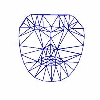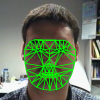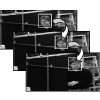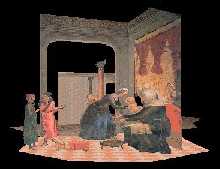
We developed a linear algorithm that uniquely recovers the 3D non-rigid shapes and poses of a human face from a 2D monocular video.
Details
We developed a cylindrical model-based algorithm for recovering the full motion (3D rotations and 3D translations) of the head in real time.
Details

Techniques for building and fitting 2D and 3D models of human faces and heads.
Details

Fast algorithms for fitting Cootes and Taylor's "Active Appearance Models."
Details

Automatic facial expression encoding, extraction and recognition, and expression intensity estimation for the applications of MPEG4 application: teleconferencing, human-computer interaction/interface.
Details

We are developing methods for real-time performance-driven animation and control of three-dimensional facial expressions using a single video camera.
Details

We are developing and evaluating human identification technologies as part of the Defense Advanced Research Projects Agency (DARPA) sponsored program in Human Identification at a Distance (HumanID).
Details

Rigid Tracking of Faces and Non-Rigid Tracking of Facial Features.
Details





